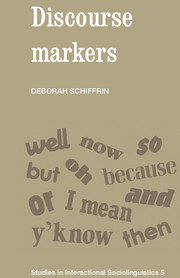Book contents
- Frontmatter
- Contents
- Acknowledgements
- Intonation and transcription conventions
- 1 Background: What is discourse?
- 2 Prelude to analysis: Definitions and data
- 3 Questions: Why analyze discourse markers?
- 4 Oh: Marker of information management
- 5 Well: Marker of response
- 6 Discourse connectives: and, but, or
- 7 So and because: Markers of cause and result
- 8 Temporal adverbs: now and then
- 9 Information and participation: y'know and I mean
- 10 Discourse markers: Contextual coordinates of talk
- Notes
- References
- Author index
- Subject index
1 - Background: What is discourse?
Published online by Cambridge University Press: 05 June 2012
- Frontmatter
- Contents
- Acknowledgements
- Intonation and transcription conventions
- 1 Background: What is discourse?
- 2 Prelude to analysis: Definitions and data
- 3 Questions: Why analyze discourse markers?
- 4 Oh: Marker of information management
- 5 Well: Marker of response
- 6 Discourse connectives: and, but, or
- 7 So and because: Markers of cause and result
- 8 Temporal adverbs: now and then
- 9 Information and participation: y'know and I mean
- 10 Discourse markers: Contextual coordinates of talk
- Notes
- References
- Author index
- Subject index
Summary
Discourse analysis
Discourse analysis is a vast and ambiguous field. Consider two recent definitions. First, Brown and Yule (1983: 1) state that:
the analysis of discourse, is necessarily, the analysis of language in use. As such, it cannot be restricted to the description of linguistic forms independent of the purposes or functions which these forms are designed to serve in human affairs.
Second, Stubbs (1983a: 1) states that discourse analysis consists of:
attempts to study the organization of language above the sentence or above the clause, and therefore to study larger linguistic units, such as conversational exchanges or written texts. It follows that discourse analysis is also concerned with language in use in social contexts, and in particular with interaction or dialogue between speakers.
Brown and Yule emphasize a particular perspective toward language (functional versus structural) which is tied to a focus on parole (versus langue); Stubbs' emphasis on a particular unit of analysis (‘above the sentence’) leads him toward a similar pragmatic emphasis on ‘language in use’. The authors then observe a definitional problem similar to the one noted above. Brown and Yule (1983: viii) observe that the term discourse analysis
has come to be used with a wide range of meanings which cover a wide range of activities. It is used to describe activities at the intersection of disciplines as diverse as sociolinguistics, psycho-linguistics, philosophical linguistics and computational linguistics.
- Type
- Chapter
- Information
- Discourse Markers , pp. 1 - 30Publisher: Cambridge University PressPrint publication year: 1987



